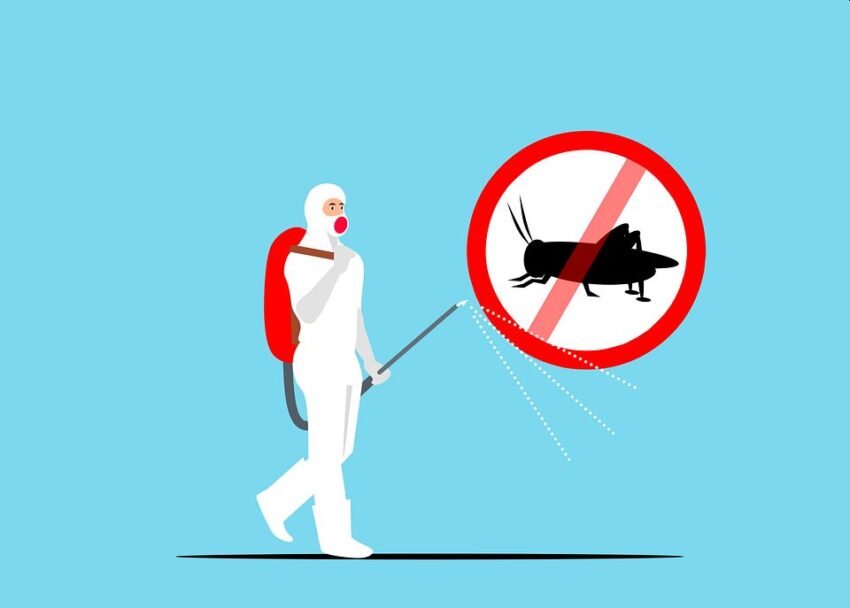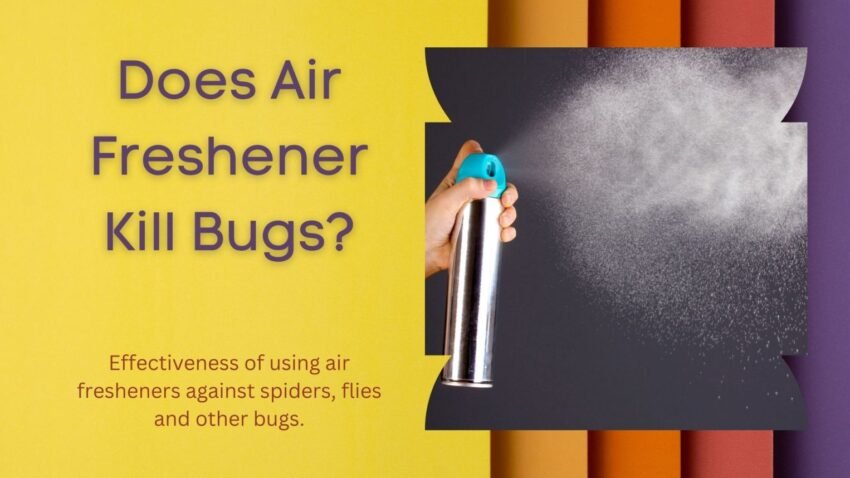It’s not rare for bugs, flies, or other critters to show up in the house. A breakout in the critter population inside the home might require aggressive pest control measures. However, things are different when the occasional bug shows up. In this case, simply reaching for a bottle or can of Febreze can do the job.
Even a single fly or bug can be very annoying. In such a scenario, we could be inclined to use tools available at home with ease. Something like an air freshener could come in handy!
But does air freshener kill bugs, flies, or other such critters? What about spiders?
It is possible to kill many insects like flies or bugs with air fresheners. However, it’s not the most effective or elegant method to do so.
As we proceed, it’s worth pointing out that air fresheners are not intended to work as insecticides. Most manufacturers discourage buyers from using these products as insecticides.
Let’s get a better understanding with a few details.
Using An Air Freshener To Kill Bugs And Flies – The Ins And Outs
Here’s something we all know – air fresheners are not bug sprays or pest killers. They’re designed to make a room smell fresh and nice, not to kill bugs.
So, how does it work to kill bugs? In most cases, dousing the bug with an air freshener is usually enough to suffocate it. Generally, this will weaken the pest and in many cases, also kill it.
The air freshener that can kill bugs is usually the spray-type and not other options like plug-in air fresheners. This is because the spray can be directed at a bug or fly, while a plug-in is just fragrance.
Does Air Freshener Kill Bugs? And How It Achieves This
If you’ve ever used an air freshener to kill bugs, spiders, or flies, you may have noticed that it’s not exactly efficient. As in, a fly doesn’t just die if exposed to air freshener. There’s a good chance that you’ll have to use a considerable amount of spray to kill the fly.
At this point, you’re actually suffocating the bug with air freshener. This is why you’ll likely need a significant amount of air freshener spray to kill a fly.
Air fresheners are a cocktail of several chemicals, often utilizing more than a hundred different chemicals. Compositions for individual brands and air fresheners can differ, and they don’t generally disclose the full combination of chemicals used.
Yet, most of them contain chemicals like limonene, ethanol, Cyclodextrin, and acetone in significant quantities. While these chemicals are not effective enough to kill a bug immediately, a continuous spray can be enough to suffocate and kill the bug.
Cyclodextrin (Hydroxypropyl) used in Febreze and a few other air fresheners can be toxic to several insects, especially ants. This chemical is derived from potatoes and sweet summer corn. Its job in the air freshener is to trap odors, rather than just covering them up.
However, there might be a little more going on here. There are concerns over the types of chemicals emitted by air fresheners, and their effect on people (not just bugs)!
For example, this paper raises questions about the potentially harmful chemicals released by air fresheners. It also includes air fresheners that brand themselves as “green” or “organic.” Of course, the cited paper is just one example, and there have been several concerns over the chemicals that an air freshener might emit.
On the other hand, air freshener brands like Febreze have tried to counter such claims. On its website, Febreze lists the ingredients used, and a “no list” for substances they don’t use in their air freshener.
Air Freshener Is An Inefficient Way To Kill Bugs
So now we’ve established that air fresheners can kill bugs. But let’s be clear, it doesn’t kill all types of bugs and flies. And even for the bug types that air fresheners can kill, they’re not the best or even an efficient solution.
Even if it’s just a fly, it’s very likely that a fair bit of the air freshener bottle is going to get used. If it takes one (or almost one) bottle of air freshener to kill a fly, it clearly isn’t the best way to go about things.
And let’s face it, a lot of bugs and critters will likely just be mildly inconvenienced by air freshener.
If it’s bugs, flies, spiders, and other critters you want to go after, it’s better to use good pest-control options rather than running around with bottles of air freshener.
Seriously, even a fly swatter is miles ahead of an air freshener when it comes to killing bugs and flies.
Does Air Freshener Attract Or Repel Bugs?
Before anyone decides to use air freshener to get rid of bugs, it’s worth considering the effects further down the line. We’ve already established that air freshener isn’t an efficient way to kill bugs. However, if it ends up attracting bugs, using air freshener definitely isn’t the way to go!
Does Air Freshener Repel Bugs?
Opinions are somewhat divided on this topic. Unfortunately, there is no clear scientific evidence to support or disprove this claim. Also, most spray-type air fresheners can vary wildly in composition, so it’s difficult to have a definite answer.
However, there are a few things that we do know, and it might be acceptable to extrapolate from there. Air freshener can kill some types of insects. Often, it also works to disrupt insect communication, which might encourage them to withdraw from the area. However, this effect is only temporary and will wear out within minutes, or at best, a few hours.
Some people claim that natural fragrances like citronella, eucalyptus, and lavender can repel bugs. But then again, many air fresheners might use synthetic fragrances, which don’t work the same way against insects. The perfume is for the human nose, it means nothing to insects!
Besides, the presence of these fragrances isn’t the same as the presence of these herbs. Therefore, their effects can be questionable at best.
All things considered, we’re back to square one. Air freshener isn’t likely to repel bugs, and any such effects are likely to be temporary.
Does Air Freshener Attract Bugs?
Now this is a question that has a more straightforward answer. Air freshener is likely to attract many types of bugs and insects. This can largely depend on the type of air freshener and the components used in them.
However, there are a few components that do show up in several products, so there is a good chance that the results will stick.
One of the components often found in spray-on air fresheners is ethyl acetate. This chemical gives off a sweet smell, which is attractive to several insects, and fruit flies in particular. Interestingly, while spraying air freshener on fruit flies can kill them, it’s also likely that air freshener will attract fruit flies. That’s a circle that will keep repeating itself!

Some chemicals in air fresheners might even resemble insect pheromones, thus attracting insects into a home. This can be particularly troubling, since insects attracted by pheromones are likely ready to mate. So, there is a potential of this causing an insect population explosion in a home.
Similarly, many air fresheners release VOCs (Volatile Organic Compounds), which might be attractive to bugs.
And finally, there’s the same question about smell. Just as there are flowers and herbs that repel insects, there are fragrances that attract insects. However, it’s difficult to say if either of these cases is true, considering that the fragrances from air fresheners may not be identical to those found in nature.
Overall, it is likely that air freshener attracts some bugs and insects, rather than repelling them. While the air freshener might be initially dangerous for some insects, its chemicals might also be attractive to insects bringing more of them into the home.
Is It Okay To Use Air Freshener Like Febreze To Kill Bugs?
Air fresheners like Febreze can be fairly effective in killing some bugs, flies, and spiders. However, it is worth remembering that they are not insecticides, and don’t function as insecticide replacements.
It might be okay to use Febreze or another air freshener or a random or occasional bug that you come across. However, if the bug problem is more severe, it is better to use an insecticide to deal with the problem.
Also, while Febreze might kill some bugs or flies, it doesn’t provide an effective solution to keeping them away. When a proper insecticide is used, it will keep an area free of bugs for several days, or even weeks. Professional pest control or pest management might provide even better results.
So, if the insect problem you’re dealing with is severe, let go of the Febreze and consider other options.
FAQ – Air Freshener Like Febreze Against Bugs And Insects
Does Febreze Kill Flies?
An average housefly can easily pass through a mist of air freshener like Febreze. However, if you do get it in a position where you can spray the air freshener directly on the fly, it might be possible to kill it.
This is likely to involve more than just a spray. Users would have to spray a considerable amount of air freshener to kill the fly.
Does Febreze Kill Gnats And Fruit Flies?
Small insects like fruit flies and gnats don’t fare well against Febreze. They are very likely to get stunned if they find themselves in an air freshener mist. Directing a few more squirts of this spray towards the insects can kill them.
Does Febreze Kill Bed Bugs?
Technically, Febreze can kill bed bugs. However, if there is an infestation, the bugs likely live deep in a mattress or cushion. It isn’t possible for the air freshener to reach such deep areas. So, while it might kill bed bugs that it comes in direct contact with, Febreze cannot end a bed bug problem.
Does Febreze Kill Ants?
Febreze can indeed kill ants. Depending on the type of ants, it might be able to kill ants on contact, or a few extra squirts might be needed to suffocate the ants. Cyclodextrin (Hydroxypropyl) contained in Febreze is toxic to ants and is very effective in killing them.
Does Febreze Kill Spiders?
Febreze can be rather quick at killing small spiders and might even manage to kill a few of the larger spiders. It is the Cyclodextrin (Hydroxypropyl) in Febreze that is harmful for spiders and can kill them on contact.
It’s worth knowing that Cyclodextrin (Hydroxypropyl) was patented by Procter and Gamble Co (P&G), which made its use possible in Febreze. Other air fresheners that don’t have this substance, may not have the same result with spiders.
Does Febreze Kill Cockroaches?
Febreze or other air fresheners cannot kill cockroaches. At best, the air freshener might be able to stun the cockroach for a short time, allowing the user to manually kill the cockroach.
Conclusion
To sum up our discussion here, we can say that air freshener can kill several bugs, flies, and other critters. Febreze might be fairly effective against ants and spiders as well.
However, it must be kept in mind that air freshener isn’t intended for use as an insecticide. Those who have an insect problem might be better served by using a proper insecticide, rather than trying to make do with an air freshener. In some cases, the air freshener might even end up attracting more bugs.
However, if it’s an occasional insect like an annoying fly or a spider, using an air freshener or Febreze might be acceptable.

